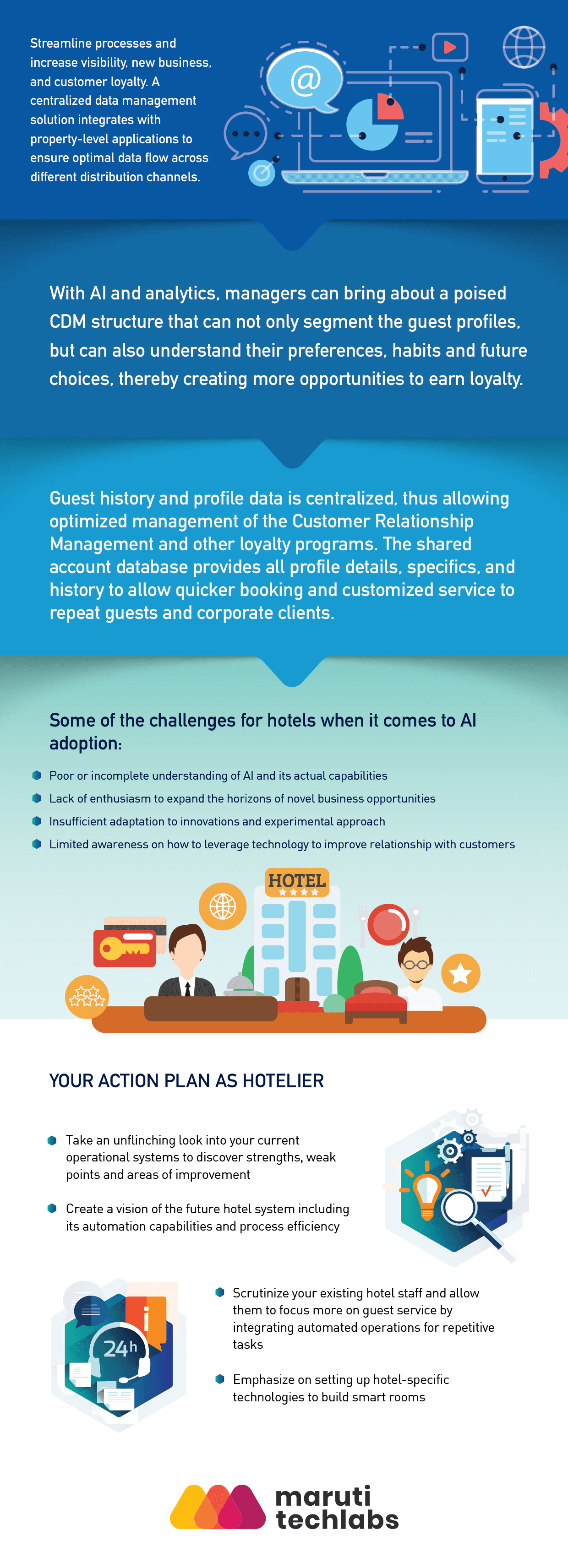Redefining Hospitality with AI: A Comprehensive Guide for Hotels
Over the last couple years, voice and text-based assistants in our pockets have pretty much become the part and parcel of our lives, and now, we’re at the point where we are comfortable with AI controlling our homes. Our previous article on “Artificial Intelligence in Hotels” spoke about how AI can impact the operational processes and dynamics within the hospitality industry.
This final article in the 3 part series will focus on using the inherent capability of AI along with predictive analytics and natural language processing to synchronize and optimize the entire information management system to deliver exceptional customer service.
Intelligent hotel system is where all the data channels are linked together just like human arteries and veins, forming a superlative, productive and high-performance structure that resembles the future vision of automated hotel system.
IoT-enabled connections of motion sensors, room control, and smart voice control are poised to change the way hotels function. Integration of IoT into intelligence-driven hotel operations will not only personalize hotel guest experience but also impact the business model of the hotel industry in the near future.
Demand-specific Optimization for Profit Enhancement
Due to seasonal changes and demand-centric nature of the hospitality industry, hotel and travel businesses are likely to adopt need-specific solutions that address rush during holidays and other unpredictable events. Hotels can benefit a lot once they can capture, understand and predict the future market demand patterns in a smart manner.
Hoteliers can forecast the ups and downs in demands with shifts in seasons and traveler choices and design the action plan that helps optimize their service offerings, pricing standards, and even brand marketing. In an industry that is as dynamic as enthusiastic travelers, being able to forecast with Big Data and Machine Learning often results in an increase in profit, competitive advantage and number of customers.
The demand-specific predictability and property optimization achieved through machine intelligence are built on seasonal choices, current trends, local events, hotel history and various cultural attributes. Using a reliable and robust forecast system designed with expert assistance from AI development services, hotels can schedule hotel room remodeling and maintenance/renovation work without disturbing the net profit outcome.

Automation and Machine Learning for emerging hotels
Much of the hopeful promises made for Artificial Intelligence in the hospitality industry are intended for established brands. Small, less celebrated hotels receive less attention even though they form a big enough segment to reap the best out of AI offerings. Since large hotels can hire more competent staff to work on a myriad of tasks, smaller brands with a limited budget and members can’t reach the goals of revenue growth and business intelligence management, eventually settling for weak solutions and average profit margins.
Given the cost of cloud computing and massive initial investment, it is unfeasible for smaller companies to drive maximum revenue even in the on-season duration economically. However, by leaning on Machine Learning and Artificial Intelligence, emerging names in the hospitality industry can automate many of their existing operations. Since automation relives staff from repeat chores, it is likely that these hotels can benefit significantly when it comes to optimizing their working capital and operational costs in general.
Furthermore, as hotel staff frees up more space to focus on improving service quality and furnishing the full range of hotel facilities for guests, it slowly results in increased operational efficiency and potential growth in annual revenue.
The Dominant Ubiquity of Digital Virtual Assistants
The rise of digital concierge and virtual assistants can be attributed to evolving travelers, vacationers and business guests who desire exemplary customer experience. Hence, to enable digital experiences with hotels, companies rely on Natural Language Processing of famous AI leaders such as Apple’s Siri, Amazon’s Alexa and Microsoft’s Cortana. To augment the experience furthermore, we will see AR purge the linguistic barriers by enabling English speaking employees to converse effortlessly with hotel guests from any part of the world using AR headsets for real-time translation.
AR is also becoming as integral as AI. UK’s largest hotel chain Premier Inn has outfitted each guest room of their Hub Hotel with an interactive wall map that contains local spots of the surrounding neighborhood. To view interesting local sites, the facility allows travelers to point their smartphones at the map.
When it comes to serving customers with AI-powered virtual assistants, Edwardian Hotels London leads the chart. The hotel in May 2015 introduced the first ever AI-based chatbots with which guests can interact via text using a smartphone to order room service and request various recommendations for spa, restaurant, hotel specials and other local attractions.
Personalization on a Larger Scale
Incorporating Artificial Intelligence in hotels is stipulated to transform room services completely by 2025 through the process of creating personalized experiences that will incorporate individual preferences. Hotels will integrate chatbots and AI as a useful tool to acquire and retain various demographics.
McKinsey claims in their research that companies are effectively personalizing their services can increase revenue by 10% to 15% and diminish service cost by 15% to 20%.
Over time, with broad adoption of Artificial Intelligence in hotels, we will see guests will enjoy hyper-personalization in the form of real-time notifications through chatbots from dinner specials, casino facilities to even babysitting services for the family.
Easy maintenance of IoT devices
Guest room technology opens up avenues for consolidation of total devices in use through IoT implementation, which reduces the cost of maintenance and purchase for hotel businesses. With the inculcation of IoT and AI in hotels, hoteliers can whittle down the chief devices such as:
- Wi-Fi access point (in-room)
- SIP telephone
- Hotel alarm clock with Bluetooth audio streaming
- Special tablets for guests
The total capital to go into installing the whole technology set would amount to nearly $800 to $900. However, if hotel brands choose to bundle them together into a single guest room device, the cost will be cut down to not more than $500.
By leveraging an all-in-one solution that involves purpose-built assistant devices and flexible controls, hoteliers can affordably run their operations while looking after their customers. Angie Hospitality is one good example of such affordable and scalable guest room assistant technology.
Centralized Data Management
A centralized data management system will redefine and streamline all the relevant data. Isolated solutions without proper synchronicity of information will obstruct both hotel operations and customer experience. CDM is necessary to evolve the methods of guest information and profile management, which further helps meet the customer expectations of receiving tailor-made services during and before the stay. The more you know your customer – the nimbler you can be in delivering customized offers and satisfying guest experience.
Also, Data analysis is key to keeping the customers engaged and interested in enjoying hotel services. With AI and analytics, managers can bring about a poised CDM structure that can not only segment the guest profiles but can also understand their preferences, habits and future choices, creating opportunities to earn more loyalty.
Apart from this, CDM enables hoteliers to understand customer behavior pattern from various touch points. As Machine Learning generates a 360-degree view of each guest, it is possible to carve out their real persona. The insight thus generated can help personalize the push messages, connect with guests in real time and create a peerless brand – which can be simplified as repeat business, brand loyalty, and word-of-mouth promotion.

Increase in Customer Acquisition, Retention, and Loyalty with Artificial Intelligence in Hotels
Call it the biggest revolution or a challenge for opportunist hotel brands – the inspiration behind mass personalization of travelers’ choices springs from the archaic system for search and booking which disappoints modern-day travelers since it is rife with a confusing array of undesirable, ordinary options.
The new range of apps now leverages AI interface engines to discriminate different travelers’ profiles to design services that best match their expectations.
AI’s intelligent algorithm can process, learn and untangle historical records of customer preferences and buying patterns to create actionable insights and suggest impactful improvements. With Artificial Intelligence in hotels playing a significant role, hotel marketers can eliminate dealing with monotonous e-mails or ad commercials.
For instance, AI can confirm the booking of the repeated customer with an email saying, “Thanks for choosing our services again, David”, instead of a plain, “Thanks for your reservation, David”. Not only this, based on his previous service inquiries, the message can even include a more customized recommendation that suits David’s personal lifestyle such as spa services on discount, free therapeutic massage or poolside assistance.
It is essential for any hospitality company to retain maximum customers and their loyalty by providing them with what they would want most as a privileged hotel guest. By knowing guest expectations, their interests, the reasons for choosing their hotel and whether they are willing to market your brand to other prospects is key to attaining maximum guest loyalty.
To resolve this, Cendyn has automated the process of building arrivals reports in 40 variables based on which hoteliers can request contact information, recommend additional services and appreciate their choices. With the help of Artificial Intelligence, analysts can watch the data such as frequency of arrivals, duration of stay, daily spending, revenue, services used, special privileges and other details. Being proactive about customizing and testing offers for each individual can result in better insight which helps in delivering the more personalized experience and brand loyalty.
Challenges down the road of AI adoption
Due to radical nature of certain hoteliers, big hotels are struggling with their legacy systems that are less interactive and ineffectively (or partially) interconnected. This is the reason why, despite the advancements in technology, hotel companies are lagging behind. Some of the challenges down the path are:
- Inadequate or incomplete understanding of AI and its actual capabilities
- Lack of enthusiasm to expand the horizons of novel business opportunities
- Insufficient adaptation to innovations and experimental approach
- Limited awareness on how to leverage technology to improve the relationship with customers
As a hotelier, what should your Action Plan look like?
Hotels that are still battling with their existing service standard and business challenges should:
- Take an unflinching look into their current operating systems to discover their strengths, weak points, and area of improvement
- Create a vision for the future hotel system including its automation capabilities, process efficiency
- Scrutinize their existing hotel staff and allow them to focus more on guest service by integrating automated operations for repetitive tasks
- Emphasize on setting up hotel-specific technologies to build smart rooms
Intelligent hotels are no longer a distant future
While it is logical to think that complete replacement of human personnel with AI and chatbots may not sound appropriate or acceptable to hotel guests, it is undeniable that today’s hoteliers need to adapt to technological advancements to run hospitality business with increased profit and revenue.
Guests, on the other hand, are growing more tech-savvy, expecting digital interactions for quick assistance and customized services in minimal time lapse. With demands for having an AI-based interconnected system in hotels getting stronger, the implementation of AI-powered automation does not seem like a far-fetching concept.
Marriott hotel chain has already stepped in to produce a futuristic version of their hotels in the USA, working with Samsung and Legrand to create guest rooms with intuitive, voice-activated controls,
Another example is Accor in Paris which is shaping smart rooms with personalized services. The common facilities some of these intelligent hotels offer are:
- Voice-activated Virtual assistants
- Room amenities controls (lighting, TV, temperature, music)
- Personalized activity suggestions
- AI-enabled housekeeping services
- IoT interconnected devices
In conclusion, customers today expect a business (esp. travel related) to know everything about them and are always on the lookout for better service or experiences. Hotels should collaborate with the right technology partner in order to identify gaps in their processes such as customer support, concierge bookings to in-room technology that can be closed with the help of integrating Artificial Intelligence and Machine Learning. It is the key to enhancing the customer experience, increasing brand recognition and loyalty along with substantial revenue gains.
Note: This article was originally published on IT Pro Portal on April 12, 2018.


















